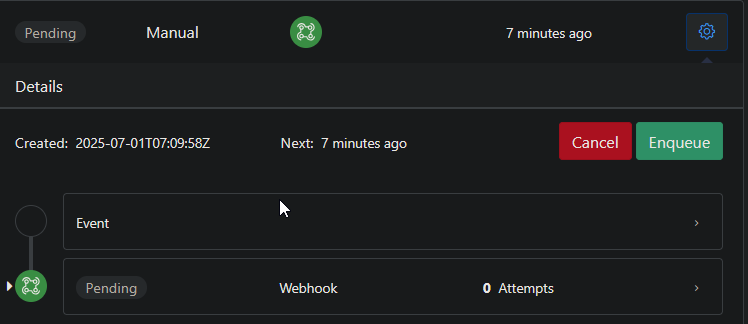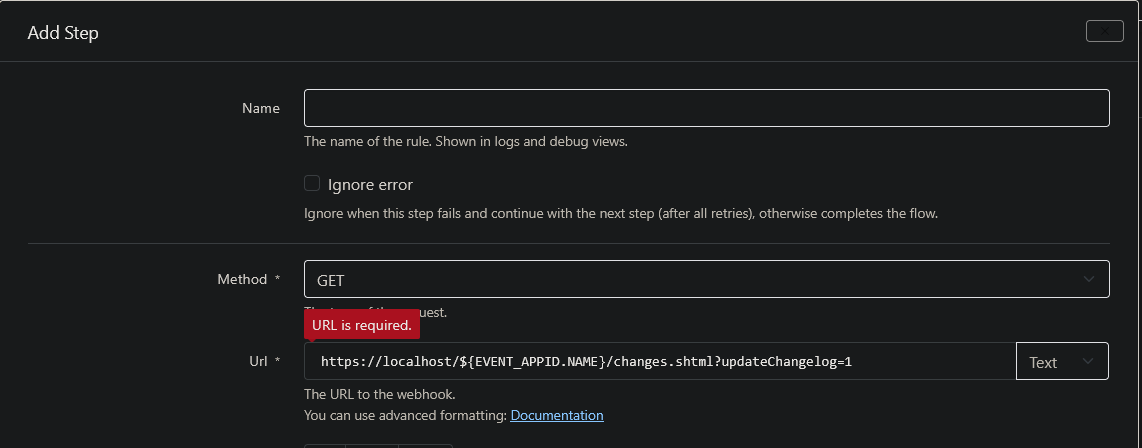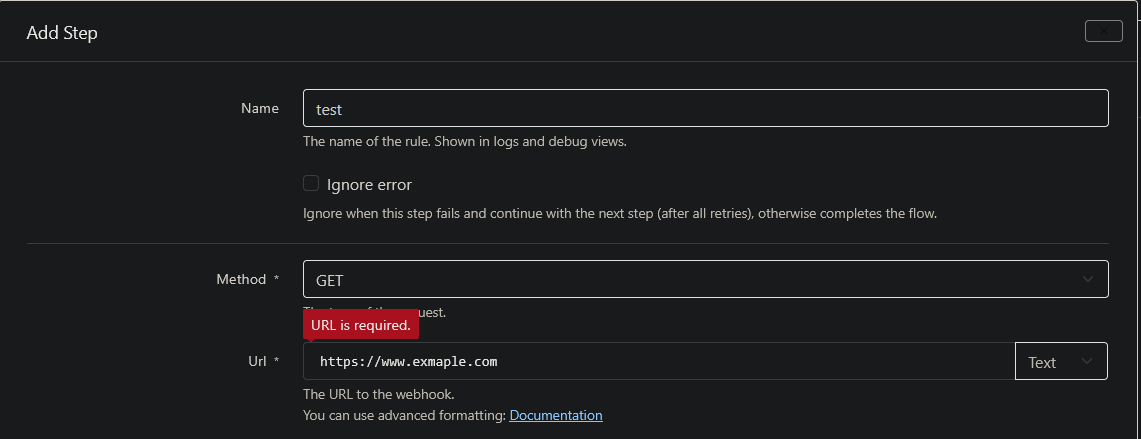Nothing in the logs. No error, no warning.
{
"logLevel": "Information",
"message": "Adding rule job for Rule(trigger=ManualTrigger)",
"ruleTrigger": "ManualTrigger",
"timestamp": "2025-07-01T14:08:11Z",
"app": {
"name": "Squidex",
"version": "7.0.0.0",
"sessionId": "de877ae3-b1e2-4870-8889-06fc5b497565"
},
"web": {
"requestId": "00-c250f1f58f5bebce1b090f09aab607f9-9f3eb7ef144bb513-01",
"requestPath": "/api/apps/dummy/rules/dd7fce32-2412-43d8-8dba-48a5d05ab300/trigger",
"requestMethod": "PUT",
"routeValues": {
"area": "api",
"action": "TriggerRule",
"controller": "Rules"
}
},
"category": "Squidex.Domain.Apps.Entities.Rules.RuleEnqueuer"
}
{
"logLevel": "Information",
"message": "HTTP request executed.",
"elapsedRequestMs": 19,
"filters": {
"appId": "0dd2b12e-5df6-4a6f-b057-5ce4bf3e5177",
"appName": "dummy",
"userId": "655ddcde9e22151f70d6bfc9",
"clientId": "squidex-frontend",
"costs": 1
},
"timestamp": "2025-07-01T14:08:11Z",
"app": {
"name": "Squidex",
"version": "7.0.0.0",
"sessionId": "de877ae3-b1e2-4870-8889-06fc5b497565"
},
"web": {
"requestId": "00-c250f1f58f5bebce1b090f09aab607f9-335fa4683fca4055-01",
"requestPath": "/api/apps/dummy/rules/dd7fce32-2412-43d8-8dba-48a5d05ab300/trigger",
"requestMethod": "PUT"
}
}
{
"logLevel": "Information",
"message": "HTTP request executed.",
"elapsedRequestMs": 4,
"filters": {
"appId": "0dd2b12e-5df6-4a6f-b057-5ce4bf3e5177",
"appName": "dummy",
"userId": "655ddcde9e22151f70d6bfc9",
"clientId": "squidex-frontend",
"costs": 0
},
"timestamp": "2025-07-01T14:08:17Z",
"app": {
"name": "Squidex",
"version": "7.0.0.0",
"sessionId": "de877ae3-b1e2-4870-8889-06fc5b497565"
},
"web": {
"requestId": "00-2fe9374fed1a6963e66b6922ef1a8dfe-495be6dbc4238e29-01",
"requestPath": "/api/apps/dummy/rules/events",
"requestMethod": "GET"
}
}
{
"logLevel": "Information",
"message": "HTTP request executed.",
"elapsedRequestMs": 8,
"filters": {
"appId": "0dd2b12e-5df6-4a6f-b057-5ce4bf3e5177",
"appName": "dummy",
"userId": "655ddcde9e22151f70d6bfc9",
"clientId": "squidex-frontend",
"costs": 0
},
"timestamp": "2025-07-01T14:08:32Z",
"app": {
"name": "Squidex",
"version": "7.0.0.0",
"sessionId": "de877ae3-b1e2-4870-8889-06fc5b497565"
},
"web": {
"requestId": "00-29475f92157db455df02014331300dce-160306918f5d4bbe-01",
"requestPath": "/api/apps/dummy/rules/events",
"requestMethod": "GET"
}
}
{
"logLevel": "Information",
"message": "HTTP request executed.",
"elapsedRequestMs": 4,
"filters": {
"appId": "0dd2b12e-5df6-4a6f-b057-5ce4bf3e5177",
"appName": "dummy",
"userId": "655ddcde9e22151f70d6bfc9",
"clientId": "squidex-frontend",
"costs": 0
},
"timestamp": "2025-07-01T14:08:33Z",
"app": {
"name": "Squidex",
"version": "7.0.0.0",
"sessionId": "de877ae3-b1e2-4870-8889-06fc5b497565"
},
"web": {
"requestId": "00-d9e588604dc279ace646ce0557a35a1e-d76f18c1897a3483-01",
"requestPath": "/api/apps/dummy/rules/events",
"requestMethod": "GET"
}
}
{
"logLevel": "Information",
"message": "HTTP request executed.",
"elapsedRequestMs": 1,
"filters": {
"costs": 0
},
"timestamp": "2025-07-01T14:08:39Z",
"app": {
"name": "Squidex",
"version": "7.0.0.0",
"sessionId": "de877ae3-b1e2-4870-8889-06fc5b497565"
},
"web": {
"requestId": "00-1ef171eb3a0cc8389948145fb2ac4a43-923b72b0e0d7c0bb-01",
"requestPath": "/healthz",
"requestMethod": "GET"
}
}
{
"logLevel": "Information",
"message": "HTTP request executed.",
"elapsedRequestMs": 4,
"filters": {
"appId": "0dd2b12e-5df6-4a6f-b057-5ce4bf3e5177",
"appName": "dummy",
"userId": "655ddcde9e22151f70d6bfc9",
"clientId": "squidex-frontend",
"costs": 0
},
"timestamp": "2025-07-01T14:08:51Z",
"app": {
"name": "Squidex",
"version": "7.0.0.0",
"sessionId": "de877ae3-b1e2-4870-8889-06fc5b497565"
},
"web": {
"requestId": "00-7e0b9e5f03abf5ac5c97233c945fc87f-47fbb47121fc1bd5-01",
"requestPath": "/api/apps/dummy/rules/events",
"requestMethod": "GET"
}
}
I thought, that recreating the rule could help, but then I found a new problem. I cannot create a webhook step because the URL is not accepted when I click the Add button:
To be sure that it isn’t related to the variable, I tried a normal URL, but same problem:


